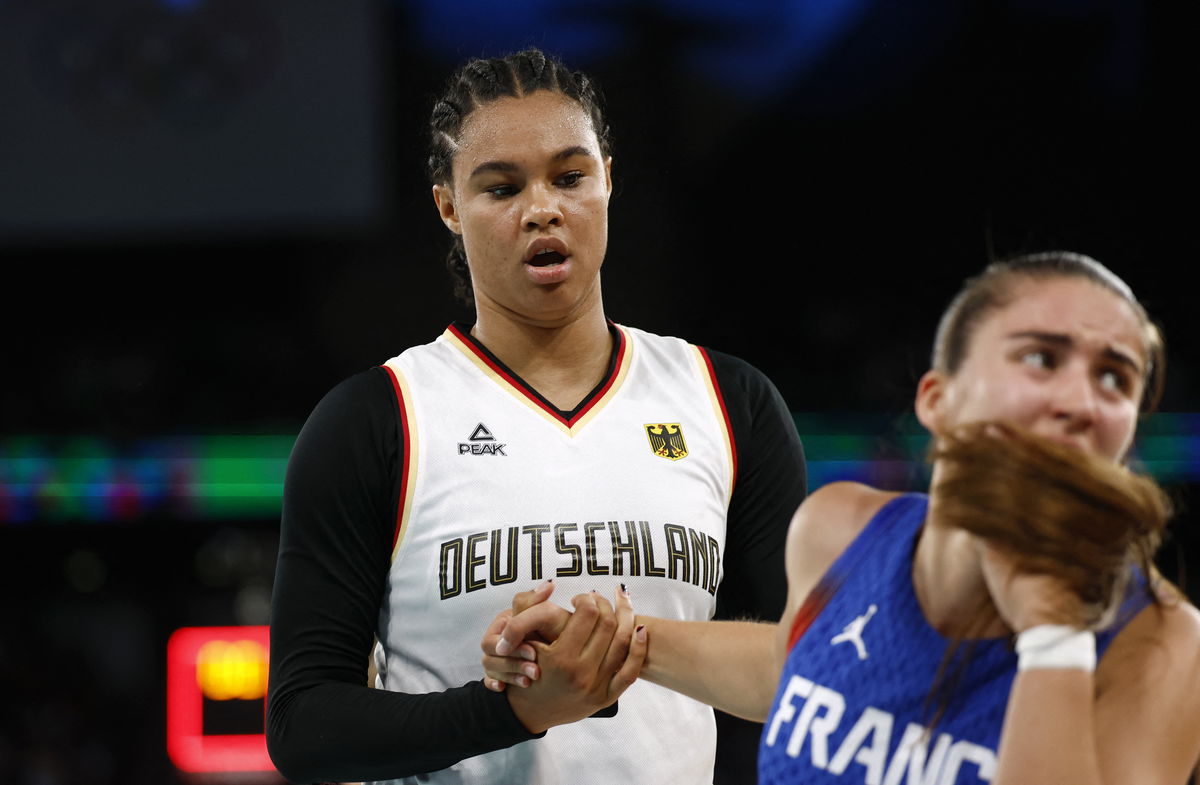
Reuters
Paris 2024 Olympics – Basketball – Women’s Quarterfinal – Germany vs France – Bercy Arena, Paris, France – August 07, 2024. Satou Sabally of Germany and Marine Fauthoux of France interact during the match . REUTERS/Evelyn Hockstein

Reuters
Paris 2024 Olympics – Basketball – Women’s Quarterfinal – Germany vs France – Bercy Arena, Paris, France – August 07, 2024. Satou Sabally of Germany and Marine Fauthoux of France interact during the match . REUTERS/Evelyn Hockstein
As the curtain falls on Paris Olympics, the players will once again get off from international duties and will be heading to league basketball. While the majority of hoopers will return to America to compete in WNBA, some European stars won’t have that opportunity due to the league’s new prioritization rule, introduced last year. However, certain players, like German star Satou Sabally, will not tolerate this rule, as they speak out against being forced to make a difficult choice.
Watch What’s Trending Now!
While Satou Sabally will be heading back to the WNBA to play for the Dallas Wings, her future is also clouded by a rule change instituted by WNBA Commissioner Cathy Engelbert last year, mandating players to prioritize the WNBA over international leagues. “As a player, I obviously criticized the prioritization rule that the WNBA implemented. I think it’s really bad to punish International players, especially players coming from France, they can’t come over at all anymore. That’s just unfair,” said Sabally during Olympics via USA Today.
when it excludes some of the world’s top talentADVERTISEMENT

Getty
SYDNEY, AUSTRALIA – SEPTEMBER 26: Emma Meesseman of Belgium shoots during the 2022 FIBA Women’s Basketball World Cup Group A match between Belgium and Bosnia & Herzegovina at Sydney Superdome, on September 26, 2022, in Sydney, Australia. (Photo by Mark Metcalfe/Getty Images)
Now, let’s try to understand the prioritization rule in detail and why it pushes European stars in a difficult position.
WNBA’s Prioritization Rule conditions and its impact on International players
The WNBA’s prioritization rule, introduced in the 2020 collective bargaining agreement, made its debut in the 2023 season. This rule mandates that players prioritize the WNBA over international leagues. It requires players with more than two years of experience to report to their teams by May 1, or face a fine for failure. Additionally, if players miss the start of the regular season on May 19, the rule will suspend them for the year. This policy turned even more harsh this year when it demanded players to join their teams by the start of training camp or the consequences will delegitimize their participation for the whole season.Now, we cannot ignore the WNBA players who head abroad during the offseason to boost their incomes. According to the Associated Press, nearly half of the league’s 144 players took their talents overseas last offseason. While WNBA’s summer season traditionally complements international leagues’ winter schedules, allowing players to stay active year-round, in recent years, the overlap between the end of some international seasons and the start of the WNBA season has created scheduling conflicts, disrupting players’ ability to seamlessly transition between leagues.
“For an international player, their main thing is playing in Europe. Prioritization really limits playing in both worlds,” said Breanna Stewart, the New York Liberty star which suggests that the problem is even bigger for the European players who are left to make a choice between enjoying some time in their home leagues or opting to play on the bigger stage of WNBA.
“[Commissioner] Cathy Engelbert can also make a stance in really wanting to incorporate International players in a new CBA, where we are in the new negotiations,” said Satou Sabally. As the debate continues, it underscores the need for a more considerate approach that respects players’ global careers.Stay tuned for more such updates. And join us for the exciting second episode of the “Dual Threat Show”. Our host BG12 sits down with Georgia Bulldogs star and Mountain West All-Freshman Team Selection, Asia Avinger.
ADVERTISEMENT
ADVERTISEMENT
ADVERTISEMENT
ADVERTISEMENT
ADVERTISEMENT

